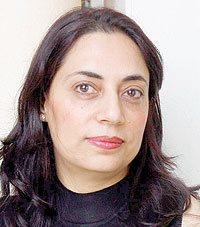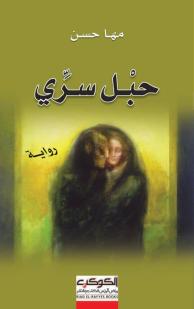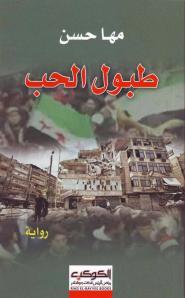مها حسن.. الحب على الفيسبوك .. والحرب في سوريا
بطلة الرواية تميل عواطفها إلى المعارضة السورية وتحمل بشدة على النظام الحاكم لكنها تسعى قبيل نهاية الرواية الى ابراز وجهات النظر الاخرى لتصل مع بعض شخصياتها الى القول ان الملامة تقع على الطرفين وإنه لا حل في الافق الا بنوع من الحوار يؤدي الى انهاء القتال والموت. الا انها تموت في النهاية خلال زيارتها لحلب في سوريا وهي على ميلها إلى "الثوار".
رواية مها حسن جاءت في 187 صفحة متوسطة القطع وصدرت عن دار (الكوكب .. رياض الريس للكتب والنشر) في بيروت.
بطلة الرواية ريما بكداش خوري التي اتخذت في البداية اسم ايزابيل صباغ على الفيسبوك خلال احاديثها مع من تحب اسمها مركب تركيبة "وطنية" بمعنى انها تأتي من ام مسيحية وأب مسلم سني.
وقد سعت مها حسن الى ان تكون البطلة ذات علاقات جيدة مع جميع ألوان الطيف الاجتماعي السوري من الناحيتين الطائفية والاثنية فلها صداقات ومحبة هنا وهناك وهنالك. والدها استاذ جامعي لعلم النفس ووالدتها مخرجة سينمائية تهتم بالوثائقيات الانسانية الهادفة. تزوج الاثنان بعد قصة حب على رغم المعارضة خاصة من بعض افراد عائلة الزوج.
كانت ريما ثائرة منذ البدايات. احبت شابا مسيحيا يدعى انطوان واقامت معه علاقة وتزوجته بعد الهجرة الى فرنسا للدرس لكن العلاقة لم تدم اكثر من سنتين. الا ان هذ العلاقة اغضبت والدها الذي لم يردها ان تتزوج هذا الشاب لا لانه مسيحي بل لانه كما يقول الوالد شخص لا يعتمد عليه.
ادى الامر إلى انقطاع العلاقات بين الفتاة وأهلها طوال عشرين سنة امضتها في باريس استاذة في جامعة السوربون. كانت تعيش في شبه عزلة وفي حال من الجفاف العاطفي وليس لها الا كلبتها التي تؤنس وحدتها.
تقول إن التجربة التي امضتها على الفيسبوك تستحق كتابا مفصلا من حيث الخبرة الكبيرة التي حصلت عليها. تقول "الفيسبوك صنع حالة ديمقراطية في المجتمع العربي بحيث وجدت المرأة مكانها فيه كما للرجل فراحت تعبر وتحكي عن يومياتها وانطباعاتها وأفكارها وتطلعاتها وهمومها."
تتعرف الى يوسف سليمان عبر الفيسبوك وهو محام سوري معارض يعيش في سوريا وينشط في مجال معتقلي الرأي ومجال التظاهرات واعلام الثوار. تقول "الحب عبر الفيسبوك او الارتباط العاطفي والتعلق بشخص لم نره من قبل. الى اي حد يمكن ان يكون ما نحياه حقيقيا وألى اي حد هو مزيف وخيالي.
ما عشته مع يوسف ليس مجرد عاطفة قوية وإدمان يومي بل كان بمثابة استعادة مفهوم الوطن... كنت وكأنني مت بالنسبة الى ابي و امي. لكن يوسف وخلال السبعة عشر شهرا تقريبا التي استمرت خلالها علاقتنا الافتراضية اعاد لي مفهوم الوطن... خلال سبعة عشر شهرا ردم يوسف هوة العشرين سنة من الانفصال عن الوطن." صارت تعرف عن كل نواحي الحياة "كأنني في دورة تدريبية للتعرف الى سورية بعد عشرين عاما من رحيلي... احسست وكأنني احتضن كل سورية بين ذراعي."
من خلال اصرارها على الاطلاع على حال السوريين تقول مستنجدة برواية زوربا اليوناني للكاتب نيكوس كازانتزاكي "السوريون يرقصون رقصة الموت الزورباوية.. يدفنون الموتى ويخرجون الى الساحات للرقص.. يعقدون الدبكات ويرقصون ثم يسقطون جثثا هامدة."
كانت تقول ليوسف انها ضد عسكرة الثورة. "لا لعسكرة الثورة... انا ضد كل ما هو تسليح وعسكرة وعنف. العنف يجلب العنف وتسليح الثورة يعني ان يقتل السوري اخاه السوري." وكان هو يسخر مما يسميه مثالياتها.
وأخيرا قررت ان تعود الى سوريا في اجازة لمدة اسبوع لتطلع فيها على الامور على الارض. وفي دمشق كادت تتجه الى فندق الا انها اتصلت بمنزل اهلها سائلة اذا كانت مرحبا بها فقوبلت بعاطفة جياشة اختلط فيها الحزن بالفرح.
ابوها لم يكن يشاطرها افكارها وقال وهو هنا يمثل الرأي الاخر المضاد للثورة انه لا يسمي الثورة ثورة بل "فوضى.. جنون.. احتجاجات غير واضحة الاهداف" مبديا تخوفه مما قد تجلبه معها من تشدد إسلامي.
يضيف الأب "انت بالذات ريما يجب ان تستحي من هذا الكلام. انت جالسة هناك بعيدة تسمعين كلام الغرب عن حقوق الانسان ولا تعرفين حقيقة ما يحصل هنا." وتوتر الجو بينها وبين ابيها الى ان تدخلت الام فخففت من حدته.
وقال انه لا يدافع عن النظام لكن "بين الاستبداد السياسي الذي نحياه والاستبداد الديني الذي سيعيدنا الى القرون الوسطى ويجردنا من بعض ما حصلنا عليه في ظل انظمة ديكتاتورية لنقع في فخ ديكتاتورية اكثر ارهابا فأنا افضل الديكتاتور الحالي." خالفته الرأي لكنها احست بأنها تحبه.
اجتمعت الى اصدقاء ومعارف وإلى شبان وشابات من الناشطين في العمل السياسي من مختلف الطوائف وجلهم من خصوم النظام الحاكم. دافعت يسرى عن الثورة وعن السلفيين وحملت على من اسمتهم "شبيحة" النظام وقالت ان قوات النظام تقتل الناس الابرياء.
قالت لريما "اما عن سؤالك عن حقوقي كامرأة في ظل خلافة اسلامية قادمة فأنا لست خائفة. اولا لا اعتقد ان مجتمعنا السوري مهيأ ليكون اسلاميا متطرفا. المرأة السورية شريكة في التظاهرات ولها دورها الان وغدا في صناعة المشهد السياسي."
اما فؤاد فقال ان الاجواء تشبه اجواء محاكم التفتيش في القرون الوسطى "ما تشهده الان هذه الحقبة المكارثية (نسبة الى اليميني المتشدد السناتور الامريكي جوزيف مكارثي) محاكم التفتيش لا على الافكار فقط بل حتى على النوايا." واضاف ان القتل ليس وقفا على النظام فقط متهما المعارضين أيضا به. "انا مؤمن بأن ثمة اطرافا في المعارضة مارست القتل ايضا لا عبر قتل الموالين فقط بل عبر قتل المعارضة لنسب القتل الى النظام."
تتصل بيوسف ويتواعدان على اللقاء. كانت هناك تظاهرة كبيرة ضد النظام. اتصلت به تليفونيا ورأته ولوح كل منهما للاخر واتجها الى الالتقاء.
هنا تقول اخر كلماتها "اقفلت الخط ورفعت يدي بالهاتف ألوح له. رأيت يوسف للمرة الاولى في حياتي... ها هو يقترب مني... وفجأة شعرت بسائل ساخن يخرج من رأسي. رأيت يوسف يقطع الشارع نحوي... لكنني هويت قبل ان يصل."
(إعداد جورج جحا للنشرة العربية - تحرير أمل أبو السعود)
من جورج جحا






